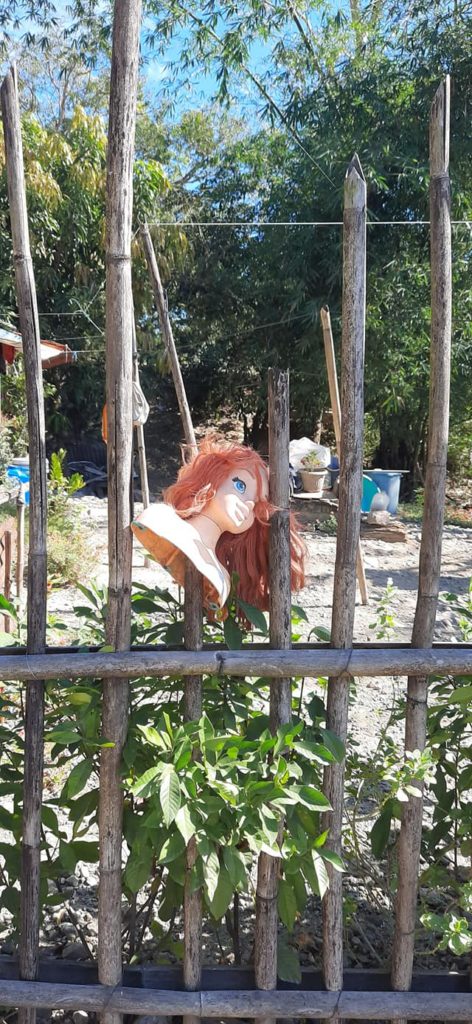
Speaking of head, I didn’t get any. Under relentless pressure, I almost succumbed (heh, you can’t spell succumbed without “cum”) to Mary’s entreaties for a rendevous. And then at the last minute, I bailed again. It seems my big head keeps overruling that other one. And honestly, the last experience with her was very unsatisfying and I didn’t want to waste my time and money on a gal with a hot bod who apparently doesn’t know how to use it.
I really don’t know if Mary is an actual prostitute. She denies it and I tend to believe her, if for no other reason than she sucks at the job. Er, well, I guess technically sucking is part of the job and she’s not good at that either. I’m really not that hard to please, but I need my partner to at least be able to pretend to be into me when I’m, um, into her. Mary apparently has no acting ability whatsoever. That last time we were together I thought she was going to cry. Not conducive to maintaining the illusion that a hot young woman is feeling the passion for my lovemaking skills. Ah well.
I guess this post was triggered by an article I came across this morning dealing with “Sex, Love, and Money in Cambodia: Professional Girlfriends and Transactional Relationships” looks at the intimate lives of Cambodian women and the idea of “transactional relationships.” It was written by a female professor from the USA so I was expecting the usual woke gibberish that passes for academia these days. I was pleasantly surprised to get an accurate depiction of the dynamics of this type of relationship. Although I’m no expert on the Cambodia scene, the author’s insights are spot-on for the P4P (pay for play) activities in the Philippines. It’s worth the read if you have any interest in the subject. These were some of the highlights for me:
…young women are using the tools around them, which in this case are sex and intimacy, to form relationships with foreign men as a means to improve their lives, make socioeconomic advancements, and ultimately find enjoyment in their lives. The book also sheds light on the relationships themselves that develop between Cambodian women and foreign men, which are multi-layered and complex, but often stigmatized as only ever commercial or only ever exploitative. After spending over 10 years talking to people, I found that often this is not the case, and that people are genuinely seeking true love and intimacy, and that intimacy and economics mingle in complex ways, as they do in any relationship, in Cambodia and beyond.
I made my first trip to the PI in 2008 and was quite astounded by this aspect of life here. Most of the gals I’ve met over the years are doing the best they can with the assets available to them. I see no difference between a woman who works on her back or a man who carries bricks on his back to make a living.
There were definitely active decisions being made to participate in this work and in this lifestyle. Most of the women were not controlled heavily by bosses and managers. They could make their own choices as to whether or not they would go with clients and what they would or would not do with clients. One of the main findings of the book was that most of them were not doing the kind of pre-negotiated sex-for-cash transaction that we often understand to be commercial sex work. It was more ambiguous than that. It was based in a grey area where sex, love and money were all coming together, but it wasn’t framed as commercial sex work – the women didn’t view themselves as sex workers, and the men didn’t view themselves as clients.
In all these years I’ve never met one woman in a bar who wasn’t there by choice. Well, let me clarify, never in the Philippines. I did know of some Filipinas who were brought to Korea under false pretenses and forced to work as bargirls.
Their argument is: “We don’t want to be rescued by people who think they necessarily know better than us.” What happens when they are “rescued,” is that often, they are often put into these rehabilitation programs or vocational shelters where they are taught to learn to sew and handle a sewing machine, and then placed back in a garment factory. This is not the socioeconomic decision they are making. It’s one that is being forced upon them by people who believe this is a more dignified form of work. What the sex and entertainment workers are demanding is respect for the decisions they make under very constrained circumstances. Bar work is a viable means of labor and employment for some of them—that they choose—and what they are calling for is recognition and respect for those decisions, made within the environments that they are in and among the limited options that they have.
Precisely. The hypocrisy of these NGO’s and government authorities who shut down the bars and “rescue” the working women is astounding. When the bars are gone, the women are forced into a much harder life, including being a streetwalker.
Well, anyway, it is what it is I suppose. I’m honestly not really into that scene myself but will partake on occasion. Some of the gals are real pros and know how to work you for the maximum payoff. Others, like poor Mary, don’t seem to have a clue. I guess it is really no different than any industry in that respect.
Moving on to other things.



Heh, I guess I’m going to get fucked after all!

There are cultures that elevate sex work to something like an art form, e.g., in old Japan. But if you’re a SE Asian lady turning tricks for Whitey, and you’re looking for understanding and respect, well… good fooking luck. You might be lucky enough to snare a man who simply wants to bask in the illusion that you like or even love him, but most guys who pay for sex aren’t that nice, and the proof comes when they eventually toss you aside for someone younger, trimmer, and better-looking. I sense a certain romanticized feminism permeating that article.
I also had to wonder how one can reconcile these two claims:
1. “There were definitely active decisions being made to participate in this work and in this lifestyle.”
2. “Bar work is a viable means of labor and employment for some of them—that they choose—and what they are calling for is recognition and respect for those decisions, made within the environments that they are in and among the limited options that they have.”
There seems to be a contradiction, or at least a tension, between “active decisions” and “limited options.” If you’re capable of exercising your free will, and you’re not being oppressed by nasty bosses, then what exactly is limiting your options to sex work? Note, too, that the author herself, by using the phrase “limited options,” seems to be tacitly acknowledging that sex work is what one turns to when one’s options are limited, i.e., it’s far from ideal as work options go. This acknowledgement is hard to square with the author’s attempt to layer a patina of feminist dignity over the sex trade. As with many feminist-fueled arguments, the author is trying to have it both ways: women are empowered, but they’re also poor, helpless victims doing the best they can. A truly empowered woman will do what she can to steer clear of a trade where she runs all sorts of avoidable risks, from catching a disease to being physically abused.
It’s complicated for sure. I am aware of former bargirls living happily ever after married lives. Honestly, I know more men who have been fucked over by these gals than vice-versa. Still, I’d never get into a serious relationship with a former prostitute. The business seems to change a woman. Back when I spent more time in those type bars I could see a difference between someone who’d been working months versus years. The gals become mercenary and jaded over time. Hmm, it just now occurs to me that maybe I’ve been unfair to Mary–she simply hasn’t learned to play the game yet.
When I first came to the Philippines I struggled with that apparent contradiction. I asked myself if I was exploiting these women by participating in the bar scene? After meeting and talking with quite a few of these working girls I came to the conclusion that I was not. All of them made the choice to work in the bar because for them it was the best available option. As one of them said, “I can work in the mall and make 300 pesos ($6.) a day. Or I can make 6000 pesos a day in the bar. I’ve got a family to support so here I am.” Many of them don’t like the job but can’t make similar money elsewhere. That’s their choice. And lots of women choose to live in poverty rather than sell their body. That’s a choice too. I am firmly in the camp of letting a woman decide for herself. When these bars get shut down by do-gooders, nobody seems to care about the “rescued” women. Many wind up on the street. At least in the bar, they can choose their customer, they get weekly STD checks and a place to stay if they need it.
So, yeah like most things, it comes down to economics. I’ve heard the guys in Thailand complain that with the (then) booming economy lots of the best gals had left the bar industry. And now that governments have chosen to destroy their economies, lots more women are considering the option of selling their most marketable asset. Prostitution is the oldest profession in the world for a reason.